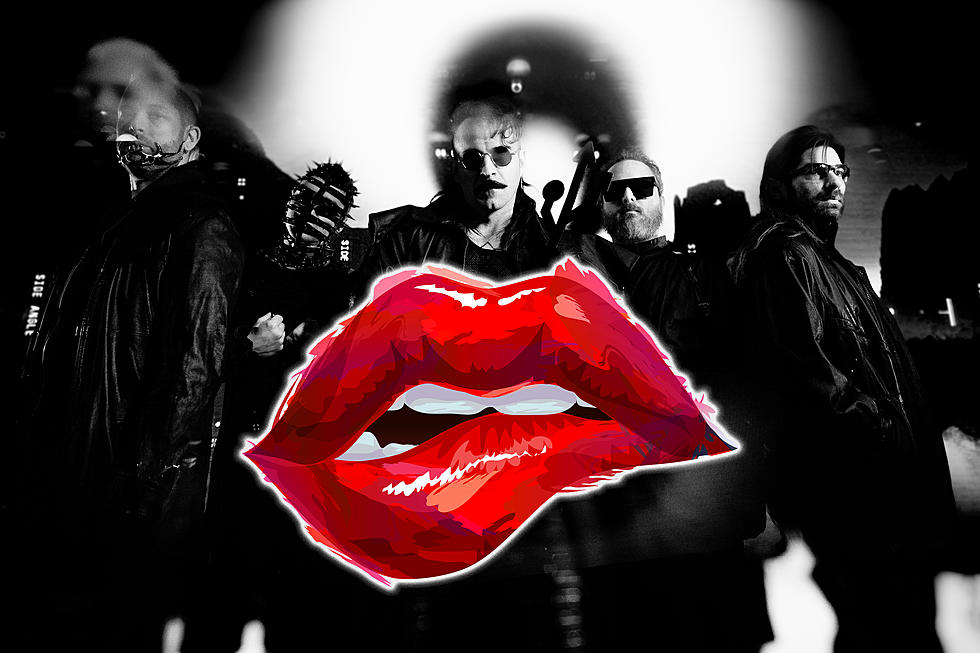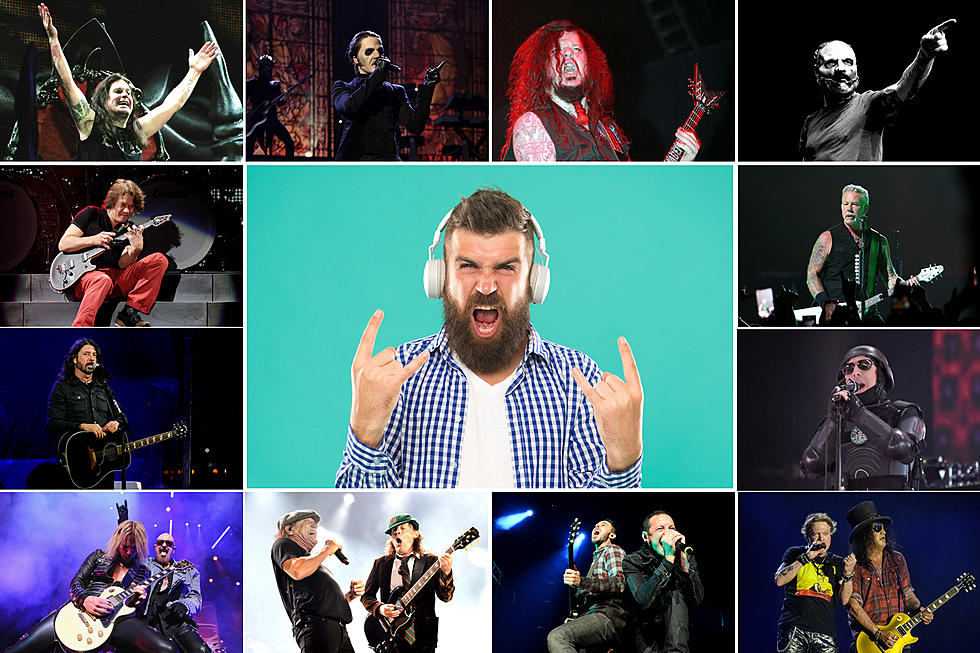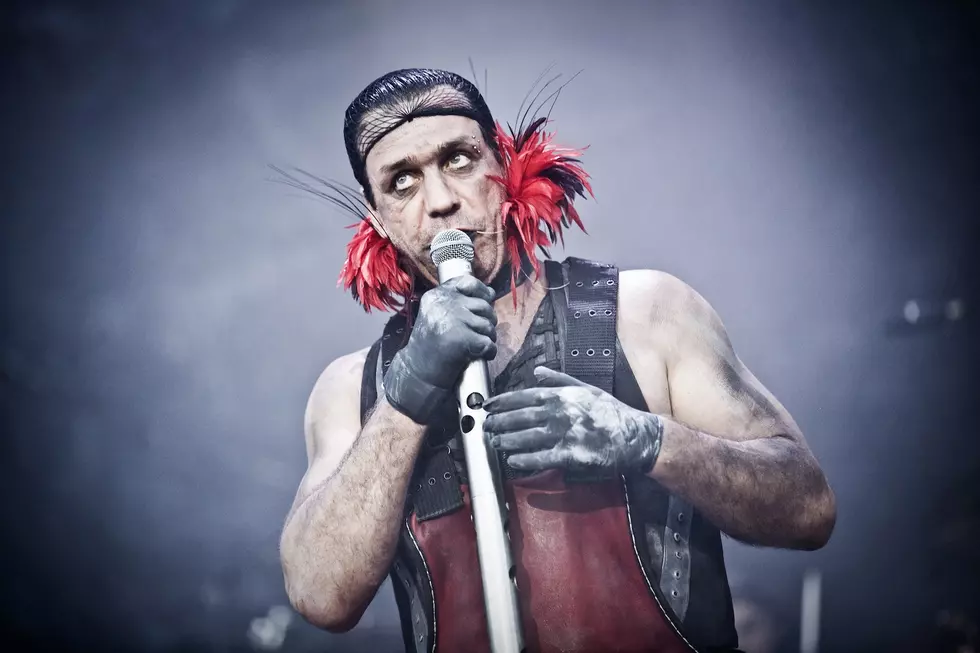
A Deeper Look at the Bombastic Theater of Rammstein
For their first show on American soil in nine years, German industrial hard rock/metal band Rammstein began with all the flair and drama of the prologue and opening number of Phantom of the Opera. Two of the band members used sledgehammers to knock through a shiny wall at the front of the stage and vocalist Till Lindemann cut a round hole into the metal with a blowtorch. The crusade began and the singer led the other musicians through “Rammlied,” the opening song from their last album, 2009’s Liebe istfür alleda. Over the next 90 minutes, Lindeman donned silvery, flaming angel wings and used hand-held flamethrowers to shoot blasts of fire above the crowd. He later “boiled” keyboardist Christian Lorenz in a giant pot as the band played “Mein Teil,” a song about German cannibal Armin Meiwes. During “Bück Dich,” the singer donned S&M garb and simulated anal sex with Lorenz, and for “Pussy” Lindemann mounted a phallus-shaped machine that spewed foam into the audience. This is a band made for the stage.
There’s no question that Rammstein’s albums stand on their own musical merits, whether they’re raging and abrasive like their first two releases (1995’s Herzeleid and 1997’s Sehnsucht) or more melodic and majestic such as 2005’s Rosenrot. Each of the records is crafted with German precision and the production is so pristine it sounds like the musicians are performing a private, hair-frazzling concert for the listener, even through shitty earbuds.
Expand the picture, however and Rammstein’s music works best as part of a multi-media experience that involves precise, Teutonic soundscapes, deafening explosions and the blatant juxtaposition of the puerile and satiric. To stretch the analogy, Rammstein albums are theatrical operas and the band’s show is tantamount to Cirque Du Soleil in Hell. It’s not a horrifying Hieronymous Bosch or Hellraiser-type of underworld. It’s more like a cartoonish, Robert Crumb vision of Hell, full of blazing skies, oversized genitalia and scary Germans.
What makes the Rammstein experience so entertaining is that the members are actors as much as musicians and fire starters (after the show there’s always a curtain call in which the players join hands and bow). As they perform, Rammstein literally and symbolically stoke the flames of discontent, conjuring images of fascism, destruction and homosexuality, all with tongue firmly inserted in cheek (or some other body orifice). Rammstein’s genius lies in their ability to provoke without being provocative. Their concerts are full of sound and fury, but when the smoke clears there’s no real message to remember, just a mental slideshow of euphoric music and fiery action. That’s not to say Rammstein don’t occasionally get political. “Amerika” is an upbeat song about capitalism and consumerism and on their new album Lindemann sings about the marked growth and power of Germany over the last 50 years (“Deutschland”) and addresses how he spent his youth in restrictive East Germany joyously and illegally listening to Western radio stations (“Radio”).
It’s impossible to deny the clear presence of Germany in Rammstein’s Wagnerian epics, especially since Lindemann sings in his native tongue. In the past, some narrow-minded individuals have confused Rammstein’s aesthetic with Nazi ideology. It doesn’t take much research into the band’s history to realize the absurdity of the accusation. Guitarist Richard Kruspe’s ex-wife Caron Bernstein is Jewish. The couple had a Jewish wedding and during their five-year marriage, Kruspe proudly went under the professional name Richard Kruspe-Bernstein. More significantly, the band would much rather address absolute power through songs about rough sex than about oppressive regimes.
Then again, the content of the band’s lyrics is secondary to the dynamics of the music, and on Rammstein, the band turns up the flames while exploring the opposite side of the sonic spectrum. Things start out heavy; the jaunty, anthemic “Deutschland” features rapid Iron Maiden-ish guitar licks and a reference to the band’s 1997 international hit “Du Hast.” The rest of Rammstein is perhaps best viewed as a libretto for a new bombastic stage presentation. The louder songs are the band’s most aggressive since 2004’s Reise, Reise. In addition to “Deutschland,” Rammstein is full of propulsive rhythms driven by Kruspe’s and Paul Landers’ chugging and buzzing guitars and supported by Lorenz’s ‘90s industrial dance music samples interweaved with new wave synth lines. And Lindemann sounds commanding as ever, whether talk-singing in a sinister growl or crooning in a booming baritone.
At the same time, the band has composed some of its softest and moodiest songs. “Diamant” is a delicate near- ballad with undistorted arpeggios, melancholy keys, mourning strings and understated industrial noises. “Puppe” combines water with fire; the song is guided by a simple, picked guitar line that builds with slowly thumping bass drum beats before bursting into an inferno of screamed, agonized vocals and rapidly strummed guitar. In addition, many of the more aggressive tracks are embellished with evocative touches that contribute to the album’s angsty vibe. On “Zeig Dich,” Rammstein blend palm-muted, staccato guitars with sustained chords and cause chills with a demon choir straight out of The Exorcist. “Auslander” features handclaps and undistorted melodic passages that lead into an anthemic chorus embellished with electro-background vocals and sparse, galactic keys. And “Sex” swaggers and staggers drunkenly, driven by a near-rockabilly part redolent of The Cramps.
The ebb and flow back and forth between climactic bursts and atmospheric frisson should give Rammstein plenty of latitude to create a new stage show as dramatic as a Broadway drama, while still containing enough pyro to level a small city. Given that it has taken Rammstein 10 years to release their new album and the band are now celebrating their 25th anniversary, it’s entirely possible the new record will be their last (Kruspe has implied that’s the case). Even if so, Rammstein have still got plenty of propane in the tank. Their European summer tour is completely sold out and the band will likely return to the U.S. in the late fall or early in 2020. If they want to go out with a bang, they’re surely schedule shows in South America, Asia, Australia and New Zealand. Then, it will probably be time to return to Europe to headline the next festival season. Where they go from there is anyone’s guess. Even if Rammstein is the band’s farewell album it seems likely that the show must go on and on and on.
Top 25 Industrial Rock + Metal Bands of All Time
More From Loudwire









